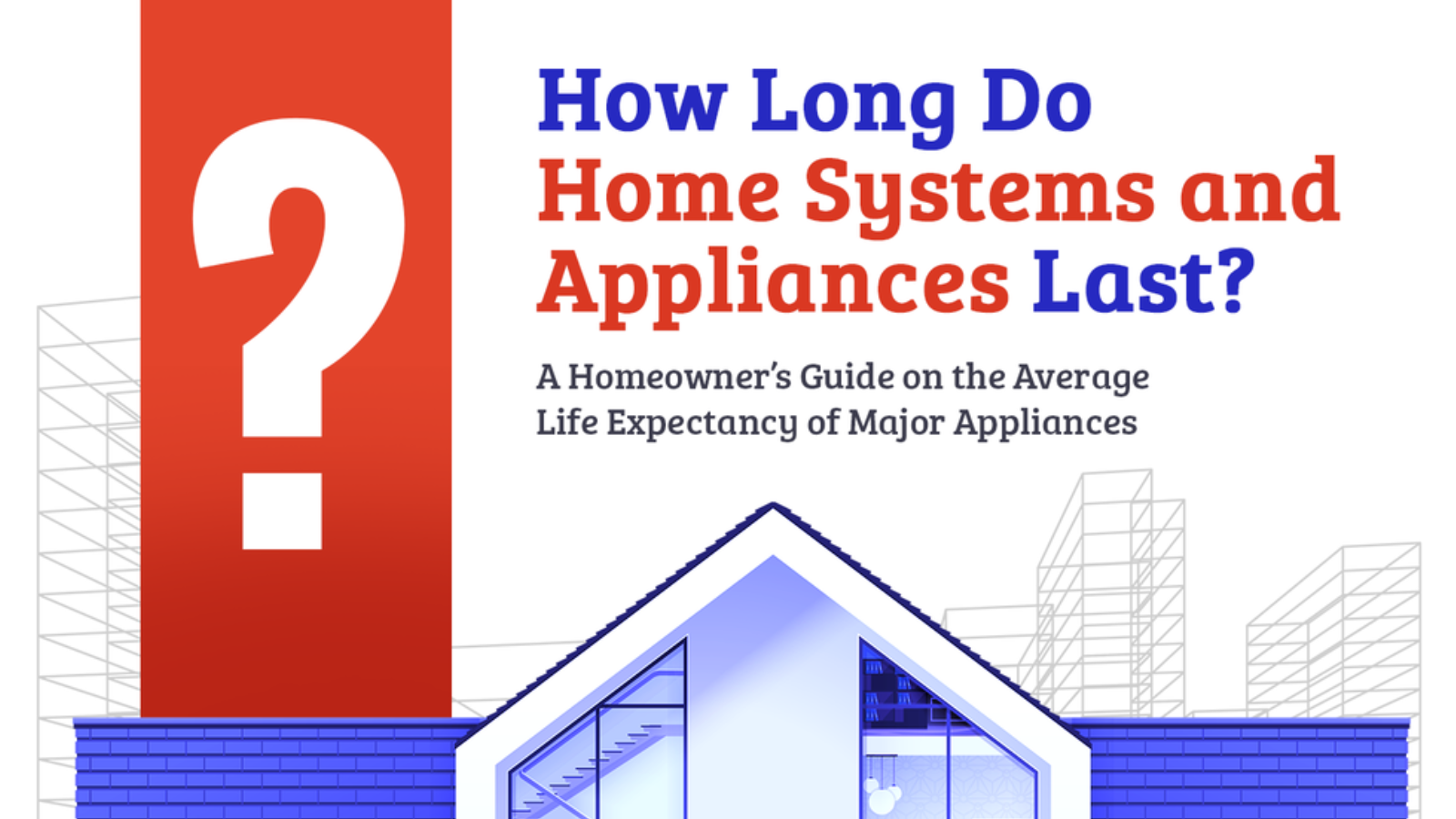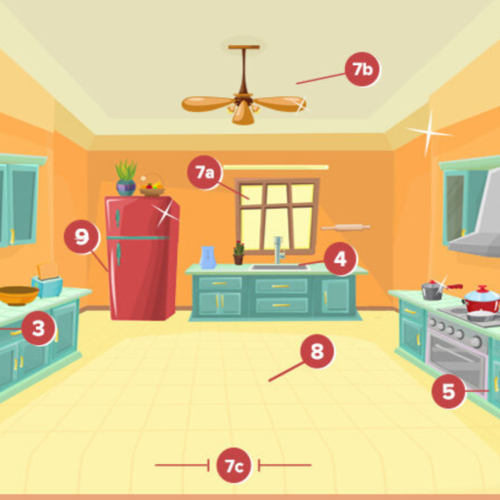As a homeowner, you know that your home’s systems and appliances don’t last forever. Understanding the average life expectancy of major appliances is essential for planning routine maintenance and avoiding costly repairs and replacements. In this guide, we will explore the expected lifespan of various home systems and appliances, with a focus on Bay Area homes. So, let’s dive in and find out how long you can expect your Bay Area home systems and appliances to last.
Table of Contents
- Introduction
- Kitchen Appliances
- Ranges
- Refrigerators
- Garbage Disposals
- Microwaves
- Ovens
- Dishwashers
- Laundry Appliances
- Washing Machines
- Dryers
- Water Heaters
- Heating and Cooling Systems
- Air Conditioners
- Furnaces
- Thermostats
- Conclusion
Introduction
Every homeowner is faced with the reality that their home’s systems and appliances have a limited lifespan. While the average life expectancy of appliances can vary depending on usage and maintenance, having a general understanding of these timelines can help you plan for replacements and avoid unexpected expenses.
In the Bay Area, where homeowners enjoy the beautiful coastal climate and stunning natural surroundings, it’s important to keep your home systems and appliances in good working order. Let’s explore the average life expectancy of major appliances commonly found in Bay Area homes.
Kitchen Appliances
The kitchen is often referred to as the heart of the home, and it’s where you’ll find several major appliances that play a crucial role in everyday life. Let’s take a closer look at the expected lifespan of kitchen appliances in Bay Area homes.
Ranges
Ranges, whether gas or electric, are typically one of the more durable appliances in your kitchen. In the Bay Area, where residents love to cook and entertain, ranges can last anywhere from 13 to 15 years. However, it’s important to note that the body or electric control unit may need repairs before the cooking units themselves. Additionally, many homeowners choose to upgrade their ranges for style and technology reasons before they reach the end of their lifespan.
Tips to make it last longer:
- Regularly clean the stovetop and grates using a mild soap/detergent, warm water, and sponge. Avoid using abrasives and sharp objects.
- Clean the oven once or twice a year, being careful when cleaning underneath oven knobs.
- Perform regular maintenance to ensure proper functioning and prevent fire hazards.
Refrigerators
Refrigerators are one of the most expensive and hardworking appliances in your home. In the Bay Area, where the abundance of fresh produce and local markets make refrigeration essential, you can expect your refrigerator to last between 10 to 15 years or more, depending on the type and brand. Compact fridges typically have a shorter lifespan, averaging around 8 years, while freezers can last anywhere from 12 to 20 years.
Tips to make it last longer:
- Clean the refrigerator’s condenser coils and check the door seals regularly.
- Wipe down handles and dispenser controls daily to remove bacteria.
- Provide enough space for proper airflow to avoid overworking the appliance.
Garbage Disposals
Garbage disposals have a relatively short lifespan due to their intense work of grinding food matter into particles small enough to flush down the drain pipes. In the Bay Area, where residents are environmentally conscious and strive to minimize waste, garbage disposals can last as little as 8 years with regular maintenance, but proper care can extend their lifespan up to 12 years. Keep an eye out for signs of wear and tear, such as weird metal clanging noises, frequent clogging, unpleasant odors, and water leakage.
Tips to make it last longer:
- Regularly clear debris from the bottom of the disposal to prevent odors. Ensure that the disposal is unplugged or turned off before cleaning.
- Avoid putting coffee grounds, eggshells, animal bones, fat, grease, oil, or hard and fibrous foods down the garbage disposal.
Microwaves
Microwaves have one of the shortest life expectancies among major kitchen appliances. In the Bay Area, where residents often rely on quick meals and reheating leftovers, microwaves typically need to be replaced every 9 years or less. Look out for signs that your microwave is nearing the end of its life, such as unpleasant odors, faulty keypads, and chipped or damaged parts. Even if it remains functional after a decade, upgrading to a newer, more energy-efficient model can save you money in the long run.
Tips to make it last longer:
- Clean the inside of the microwave frequently to remove food splatter. Remove the carousel tray and clean it in the sink, along with the area underneath the carousel.
- Only run the microwave when food or liquids are inside.
- Use the microwave for its intended purpose and avoid overloading it.
Ovens
Ovens are typically one of the longest-lasting appliances in your kitchen. In the Bay Area, where residents love to bake and cook family meals, gas ovens can last around 15 years, while electric ovens have an average lifespan of 13 years. Regular cleaning and maintenance can help keep your oven functioning properly and looking its best.
Tips to make it last longer:
- Clean your oven seasonally, especially after any big cooking marathons. Follow the manufacturer’s instructions or use a paste of baking soda and water as a mild abrasive.
- Avoid using self-cleaning features frequently, as they can be harsh on the oven’s components.
Dishwashers
Dishwashers are a time-saving essential in any kitchen. In the Bay Area, where residents appreciate convenience and efficiency, dishwashers have an average life expectancy of about 9 years. However, with proper maintenance and less usage, they can last even longer. Regularly cleaning the filter and ensuring proper drainage can help extend the lifespan of your dishwasher.
Tips to make it last longer:
- Clean the dishwasher’s filter regularly and check for proper draining.
- Remove food scraps and debris that could clog the filter or drain lines.
- Occasionally wash dishes by hand to reduce wear and tear on the dishwasher.
Laundry Appliances
Next, let’s explore the life expectancy of laundry appliances commonly found in Bay Area homes.
Washing Machines
Washing machines play a vital role in keeping your clothes clean and fresh. In the Bay Area, where residents embrace an active outdoor lifestyle, washing machines typically last up to 10 years. However, the lifespan can vary depending on the design and maintenance of the machine. If your washing machine starts to work less efficiently and has been in use for almost a decade, it may be more cost-effective to replace it with a new model.
Tips to make it last longer:
- Clean the washing machine monthly to remove detergent residue that can trap soil and bacteria.
- Use the right type and amount of detergent to avoid build-ups in the machine.
- Check the water hoses regularly for kinks or rips and avoid overloading the machine.
Dryers
Dryers work hand in hand with washing machines to complete the laundry process. In the Bay Area, where residents enjoy the convenience of dry, ready-to-wear clothes, dryers typically have a lifespan of around 13 years. Regularly cleaning the lint trap and ensuring proper airflow can help extend the life of your dryer.
Tips to make it last longer:
- Clean the lint trap after every use to prevent stress on the dryer.
- Remove debris from the screen and vent leading to the outside to improve dryer operation.
- Avoid putting soiled clothes in the dryer.
Water Heaters
Water heaters are essential for providing hot water for your daily needs. In the Bay Area, where residents appreciate warm showers and a cozy home environment, the lifespan of water heaters can vary depending on the type. Tankless water heaters typically last more than 20 years, while electric or gas tank water heaters have a life expectancy of about 10-11 years. Regular maintenance and addressing any signs of rust or moisture can help prolong the life of your water heater.
Tips to make it last longer:
- Perform annual descaling to prevent sediment buildups, especially if your area has hard water.
- Replace the sacrificial anode rod every three to five years to extend the lifespan of your water heater.
Heating and Cooling Systems
Heating and cooling systems are crucial for maintaining a comfortable indoor environment throughout the year. In the Bay Area, where residents experience mild winters and moderate summers, these systems can last anywhere from 15 to 20 years. Let’s explore the expected lifespan of different components of heating and cooling systems.
Air Conditioners
Air conditioners are essential for keeping your home cool during hot summer months. In the Bay Area, where residents value comfort and energy efficiency, air conditioners typically last an average of 15 to 20 years. Regular maintenance, including cleaning or replacing filters, can help prolong the life of your air conditioner.
Tips to make it last longer:
- Clean or replace air filters regularly to keep the system running smoothly.
- Schedule regular maintenance checks to identify and address any issues early on.
Furnaces
Furnaces are responsible for heating your home during colder months. In the Bay Area, where residents enjoy a mild climate, furnaces have an average lifespan of 15 to 20 years. Regular maintenance, including cleaning and inspection, can help ensure the longevity of your furnace.
Tips to make it last longer:
- Schedule regular maintenance checks to clean and inspect the furnace.
- Replace air filters regularly to prevent dust and debris from affecting the system’s performance.
Thermostats
Thermostats are essential for controlling the temperature in your home. In the Bay Area, where residents value comfort and energy efficiency, most thermostats have a lifespan of about 10 years. However, some models can last even longer depending on the make, model, and type.
Tips to make it last longer:
- Follow the manufacturer’s instructions for proper use and maintenance of your thermostat.
Conclusion
In conclusion, understanding the average life expectancy of major home systems and appliances is crucial for Bay Area homeowners. By knowing when to expect replacements or repairs, you can better plan for maintenance and avoid unexpected expenses. Remember to regularly clean and maintain your appliances, schedule professional maintenance checks, and be mindful of signs that indicate it’s time for a replacement. With these tips and knowledge, you can ensure your Bay Area home systems and appliances last as long as possible, providing you with comfort and convenience for years to come.








